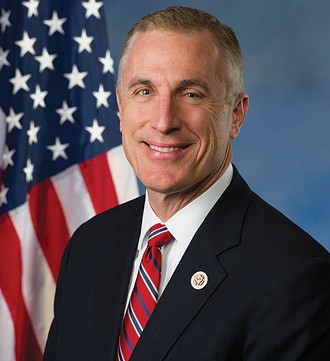Before the eventual scrapping of the American Health Care Act, dozens of health-care-related organizations came out in opposition to the bill, including prominent mental-health organizations like the American Psychological Association and the American Psychiatric Association. The latter sent a letter to Congressional leaders on March 22 saying the AHCA’s proposed rollback of Medicaid expansion “will threaten the 1.3 million Americans with serious mental illness and the 2.8 million Americans with substance-use disorders who gained coverage for the first time under the expansion.”
But curiously, U.S. Rep. Tim Murphy (R-Upper St. Clair), a licensed psychologist and mental-health-care advocate, approved of the bill, which was meant to replace the Affordable Care Act. On March 16, Murphy penned an op-ed in the political newspaper The Hill defending the AHCA, writing that it will “further mental health and addiction treatment”; the same day, Murphy said on KDKA radio that “I am going to vote yes on this.”
These views have led to confusion among Murphy’s constituents. Along with the many mental-health experts who have weighed in on the AHCA, constituents maintain it will be harmful to those facing mental-health and substance-abuse issues.
On March 22, Susan Pardus and a dozen other constituents protested outside Murphy’s Greensburg office, calling on him to oppose the AHCA.
“Given that 24 million people are going to lose coverage, and 29 percent of these people suffer from mental-health and substance-abuse issues,” wrote Pardus in an email to City Paper, “there is simply no way [Murphy can] claim this law was crafted to further mental health and addiction treatment.”
Throughout his tenure in Congress, Murphy has been most passionate about the issue of mental-health-care reform. On March 22, he received the Mental Health Champion Award from the National Association of Psychiatric Health Systems for his ongoing work to pass mental-health-care laws, including the Helping Families in Mental Health Crises Act of 2016. (Ironically, NAPHS co-signed a letter to Congress on March 9 saying it couldn’t support the AHCA.)
Murphy didn’t respond to CP’s questions asking how the AHCA would improve mental-health and addiction care. But throughout the markup process of the AHCA, Murphy positioned himself as a defender of mental-health care. He introduced an amendment to the AHCA to ensure mental-health parity (a rule requiring health-care providers to cover as much mental-health care as physical health care), but Murphy withdrew this amendment upon discovering parity wouldn’t be affected.
In interviews, Murphy has repeatedly pointed out that suicides and opioid addiction have increased during the tenure of the ACA. He believes states should take on the challenges of mental-health problems, believing they can offer a more flexible approach. “I say states know how to do this,” said Murphy on KDKA radio. “The mental-health services are a mess. I don’t know how it can be worse than how it is now.”
But even those who know Murphy well are confused by his positions. Richard Frank is a health-care policy expert and professor at Harvard Medical School. In the past, Frank has worked with Murphy on mental-health-care bills, but he’s perplexed by Murphy’s moves regarding the AHCA.
“I have a ton a respect for him, and I don’t get it,” says Frank. “Except that maybe he wants to be a team player.”
He says Murphy’s focus on ensuring parity wouldn’t mean much, since all health care would likely be worse under the AHCA.
“Even though they have parity, you have parity over really crummy coverage,” says Frank. “If you are a low-income person who has mental-health issues, I think it actually disadvantages them currently.”
Rep. Joe Kennedy (D-Mass.) questioned Murphy’s motives in a House committee meeting on March 8. He shares Murphy’s passion for mental-health care and agrees the system is “terribly broken.” But he differs from Murphy, who supports cutting federal funds and putting the burden on states to raise money on their own.
And while Murphy did secure an additional $15 billion for mental-health care and addiction treatment for the AHCA, Kennedy says this grossly underfunds the problem. Currently the ACA funds essential health benefits, including coverage for mental health, substance abuse, maternity, rehab, and ambulatory care, with $880 billion over 10 years. With Murphy’s amendment, proposed funding of essential health benefits under AHCA would decrease to $115 billion over 10 years.
“Giving the states the ability to do this, and not funding them, doesn’t solve that problem,” Kennedy tells City Paper.
Kennedy believes it’s essential for Congress to fund mental-health and addiction services, since suicide and opioid addiction are sharply increasing in rural areas, where health-care services are often limited.
“This is a particular problem in rural America,” says Kennedy. “In 55 percent of the counties in our country, there is not a single practicing psychiatrist, psychologist or social worker.”
All of the counties in Murphy’s district, which is mostly rural, have had opioid-overdose deaths well above the state average of 27.4 per 100,000, according to 2015 data. And some of his constituents aren’t happy about their representative’s position.
Mykie Raidy, of the South Hills, believes Murphy, who opposes the ACA and yet supports mental-health care, has “painted himself into a corner.”
“All [Murphy] can do is repeat the tired (and inaccurate) lines about how everything wrong with our mental-health system is Obama’s and the ACA’s fault,” wrote Raidy in an email to CP. “Otherwise, he’d have to admit that he and the GOP leadership have been wrong about the ACA and are even more wrong about their current bill.”



















